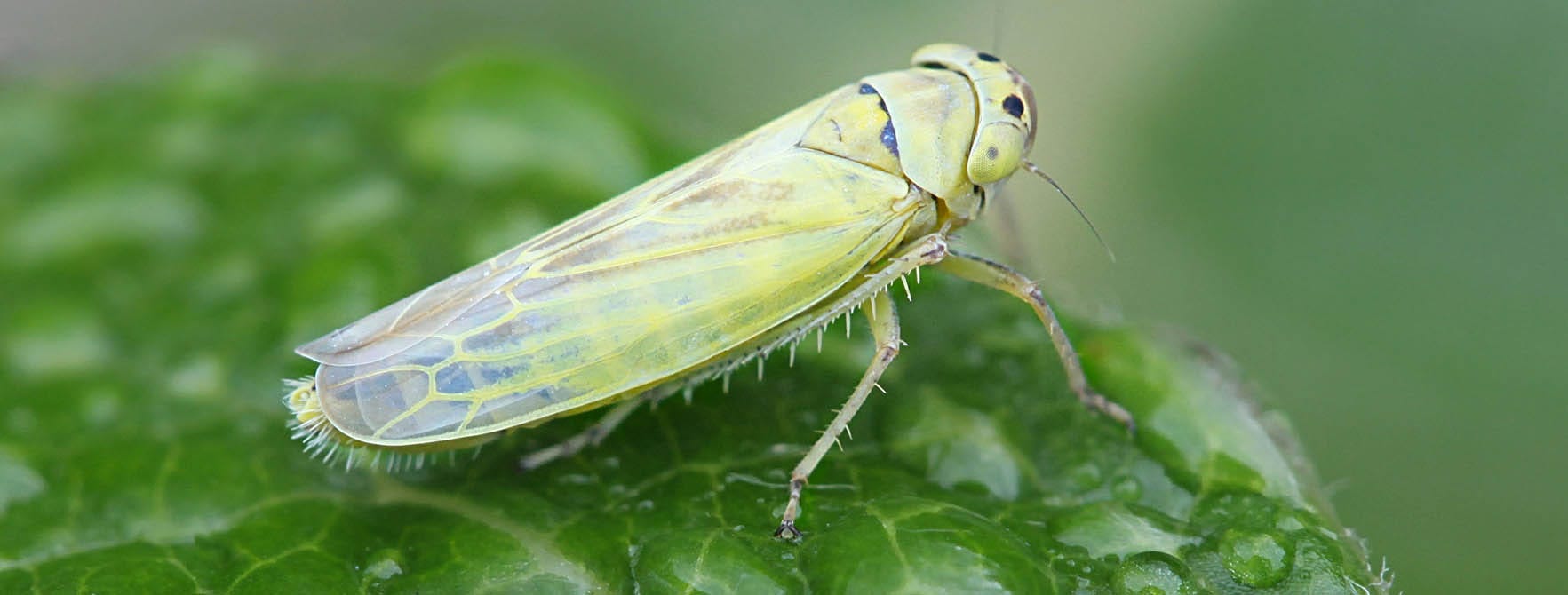
So... What are Leafhoppers?
Adult leafhoppers are brown, gray, or greenish in color and measure up to 1/2" in length. These thin, wedge-shaped insects will take flight immediately if disturbed.
Nymphs look like smaller adult leafhoppers, but they do not have wings and therefore, jump about if bothered. The eggs of the leafhoppers are so tiny, they generally will go unseen.
Reproduction Patterns of Leafhoppers
Adult females lay eggs in the spring when trees start sprouting leaves. She lays her eggs inside the leaves. These eggs generally hatch within two weeks and the nymphs emerge and begin their development, feeding on the juices of the leaves and stems.
After several weeks or months of feeding and several moltings, they will develop into adults. The length of time for development depends upon the species of leafhopper.
Leafhopper's Habitat
Leafhoppers are found throughout the world, including North America. They are found in almost all habitats where leafy vegetation is found. They inhabit forests, deserts, agricultural fields and home gardens, and most habitats in between!
Symptoms of Leafhopper Damage
Because they drink the juices of fruits and vegetable plantings, they can cause a variety of symptoms and problems. Leaves may appear yellowed and curled or have brown tips.
Results of a Leafhopper Infestation
Leaves may become yellowed and curled or they may end up with brown tips. Plant growth may be slowed or halted. Plant viruses may be spread by leafhoppers.
Leafhopper Controls
What?
Insecticidal soap products like Safer® Brand Insect Killing Soap can be very useful in controlling leafhoppers.
How?
Insecticidal soaps (Potassium Salts of Fatty Acids) penetrate the soft outer shell of the leafhopper, causing its cells to "leak" and resulting in the death of the insect.
When?
Spray Safer® Brand Insect Killing Soap as a contact killer. Use in accordance with directions on the product label.
Safer® Brand offers a variety of leafhopper control products to help control and eliminate this garden pest and revive your plants. Please check out our leafhopper control products for more details about how they work and how, when, and where they should be applied.
If you are concerned about a plant or unsure of how it will react to these solutions, test an inconspicuous area and wait 24 hours before full coverage. As a general rule, much like watering, do not use any liquid insecticides in the peak of the day or when temperatures exceed 90°F.
Natural Predators
What?
Parasitic wasps and predatory flies can help control leafhoppers. Other predators include birds, lizards, spiders and lacewings. These insects are great partners to help control leafhopper infestations in your organic garden.
How?
Parasitic wasps, lady beetles and lacewings find leafhoppers to be a delicious delicacy, and will devour them without hurting your plants.
Parasitic wasps lay their eggs inside the leafhopper's body eventually killing the host insect. Lure parasitic wasps to your garden by planting nectar or pollen producing plants.
Once these garden helpers appear and attack the leafhoppers, you will start noticing a decline in the leafhoppers on your plants.
To aid the organic gardener, parasitic wasps can be purchased through a commercial insect breeder. Make sure if you purchase these insects you have an actual garden insect infestation or you may notice the parasitic wasps migrating to your neighbors yard in search of food.
When?
Lacewings, lady beetles and parasitic wasps will appear shortly after the leafhoppers invade your garden. They can be purchased at any time during the growing season when a leafhopper infestation is present.
Most local greenhouses and garden centers can help you determine the right planting time for nectar and pollen producing plants to ensure that the pollen and nectar will be available when the predators arrive.

